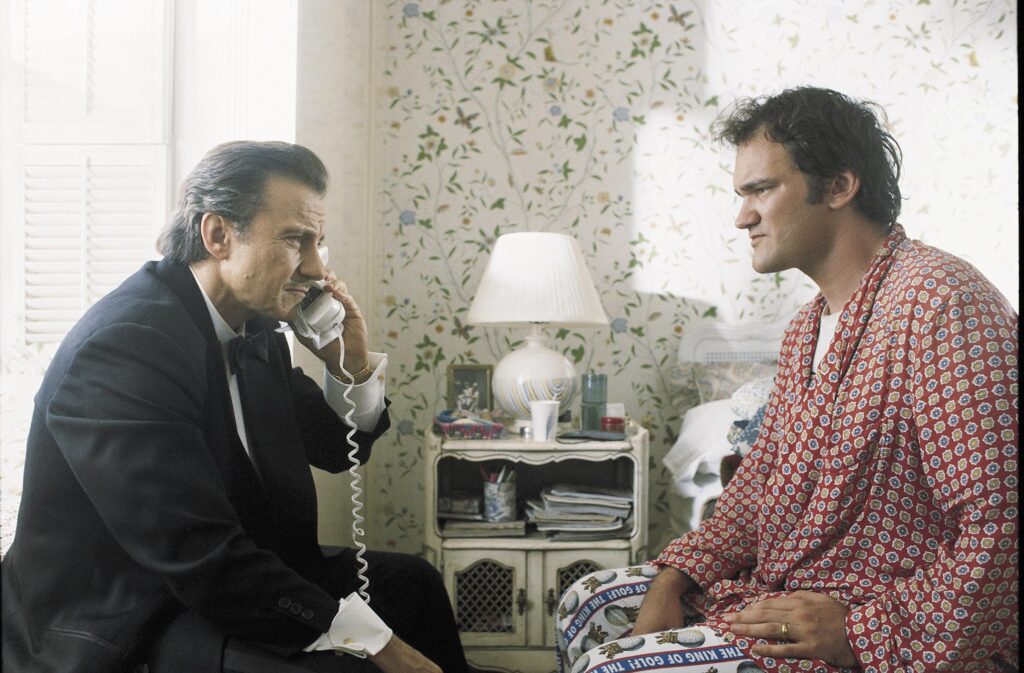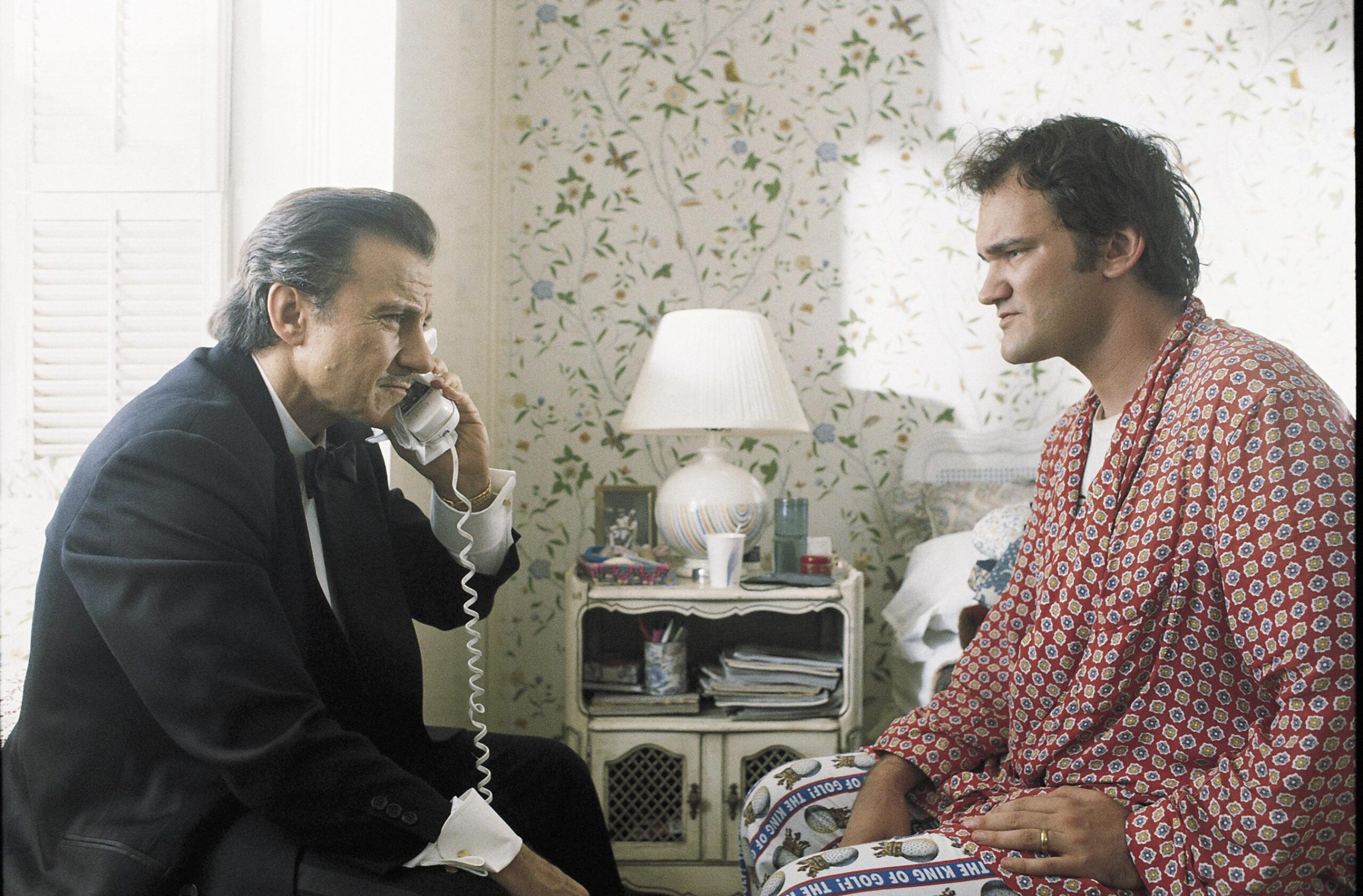
Quentin Tarantino’s Subversive Cameo in Pulp Fiction: A Deep Dive
Quentin Tarantino’s Pulp Fiction is a cinematic masterpiece, a non-linear narrative that redefined independent filmmaking in the 1990s. While celebrated for its sharp dialogue, iconic characters, and groundbreaking structure, one often-overlooked aspect is Tarantino’s own on-screen appearance. His role as Jimmie Dimmick, a friend of Jules Winnfield (Samuel L. Jackson) and Vincent Vega (John Travolta), is more than just a cameo; it’s a carefully constructed element that adds another layer of complexity to the film. This article will explore the significance of Quentin Tarantino in Pulp Fiction, analyzing his performance, its narrative function, and its contribution to the film’s overall impact.
The Role of Jimmie Dimmick: More Than Just a Friend
Jimmie Dimmick is introduced in a high-stakes situation. Jules and Vincent, having accidentally shot Marvin in their car, desperately need a place to clean up the mess before the Wolf (Harvey Keitel) arrives. Jimmie’s suburban home becomes the temporary sanctuary, and he reluctantly agrees to help, driven by the fear of what his wife, Bonnie, would do if she found out. This scenario, fraught with tension and dark humor, perfectly encapsulates the Tarantino style.
Tarantino’s portrayal of Jimmie is crucial. He plays him as a stressed-out, slightly neurotic everyman, far removed from the cool, collected hitmen that Jules and Vincent embody. Jimmie’s anxiety about Bonnie discovering the situation provides comedic relief, but it also highlights the contrast between the criminal underworld and the ordinary lives it intersects.
Narrative Function: Bridging Worlds
Jimmie Dimmick serves a vital narrative function in Pulp Fiction. He connects the hyper-violent world of Jules and Vincent with the mundane reality of suburban life. His home becomes a temporary meeting point for these disparate worlds, forcing the audience to confront the absurdity of the situation. The scene in Jimmie’s house is pivotal; it allows the audience to experience the consequences of violence and the lengths to which people will go to cover it up.
Furthermore, Jimmie’s character emphasizes the interconnectedness of the stories within Pulp Fiction. The film is structured as a series of vignettes, and Jimmie’s appearance helps to weave these threads together. He is a common point of contact between the different narratives, reinforcing the idea that everyone is connected, even in the sprawling landscape of Los Angeles.
Tarantino’s Directorial Influence on His Performance
As both the director and the actor, Quentin Tarantino had complete control over Jimmie’s portrayal. This allows for a level of self-awareness and subversion that is characteristic of his filmmaking style. Tarantino doesn’t shy away from making Jimmie appear somewhat pathetic and out of his depth. This vulnerability is a deliberate choice, designed to contrast with the more traditionally heroic or villainous characters in the film.
The dialogue Quentin Tarantino wrote for Jimmie is particularly noteworthy. His lines are often delivered with a nervous energy, reflecting his fear and frustration. The constant references to Bonnie and her potential reaction add a layer of humor to the scene, but they also serve to humanize Jimmie, making him relatable to the audience. The tension is palpable. [See also: Analyzing Dialogue in Pulp Fiction]
The Significance of Jimmie’s Wardrobe and Setting
The visual elements surrounding Jimmie Dimmick further enhance his characterization. His simple wardrobe—a t-shirt and shorts—stands in stark contrast to the sharp suits worn by Jules and Vincent. This visual difference reinforces the idea that Jimmie is an outsider, an ordinary man caught in an extraordinary situation.
Similarly, the setting of Jimmie’s suburban home is crucial. The bright, clean interior is juxtaposed with the gruesome scene unfolding within. This contrast highlights the disruption caused by violence and the attempt to maintain a semblance of normalcy in the face of chaos. The coffee that Jimmie makes for everyone also adds to the domesticity of the scene. It adds a hint of suburban banality to an otherwise heightened moment.
Quentin Tarantino’s Cameos: A Recurring Theme
Quentin Tarantino’s appearance in Pulp Fiction is not an isolated incident. He has made cameos in many of his films, often playing characters that are peripheral to the main plot. These cameos serve several purposes. They allow Tarantino to insert himself into his own cinematic universe, creating a sense of continuity and self-referentiality. They also provide an opportunity for him to showcase his acting abilities, albeit in a limited capacity.
Furthermore, these cameos can be seen as a form of auteurism, asserting Tarantino’s control over his films and signaling his unique vision. By appearing on screen, he reminds the audience that they are watching a Quentin Tarantino film, with all the stylistic flourishes and thematic concerns that entails.
Jimmie Dimmick and the Subversion of Genre Conventions
Pulp Fiction is known for its subversion of genre conventions, and Jimmie Dimmick’s character is a prime example of this. In a typical crime film, the characters involved in cleaning up a crime scene would likely be hardened criminals or seasoned professionals. However, Tarantino presents Jimmie as an ordinary man who is clearly out of his element. This subversion of expectations adds to the film’s humor and its overall sense of unpredictability.
The fact that Jimmie is more concerned about his wife’s reaction than the potential legal consequences of his actions is also a departure from genre norms. This focus on the personal and the domestic grounds the film in a relatable reality, even as it explores the extremes of violence and criminality.
The Impact of Quentin Tarantino in Pulp Fiction on the Film’s Legacy
The presence of Quentin Tarantino in Pulp Fiction, both as director and actor, has had a significant impact on the film’s legacy. His unique vision and stylistic choices have made the film a cultural touchstone, influencing countless filmmakers and shaping the landscape of independent cinema. His role as Jimmie Dimmick, while seemingly small, is an integral part of this legacy.
By appearing in his own film, Tarantino reinforces his status as an auteur, a filmmaker with a distinctive and recognizable style. His cameo serves as a reminder that Pulp Fiction is not just a collection of scenes and characters, but a cohesive work of art with a singular vision. Quentin Tarantino’s careful execution of this vision solidifies the film’s place in cinema history.
Pulp Fiction: A Lasting Impact
Pulp Fiction remains a highly influential film, studied in film schools and celebrated by audiences around the world. Its non-linear narrative, sharp dialogue, and memorable characters have all contributed to its enduring popularity. And while Quentin Tarantino’s performance as Jimmie Dimmick may not be the most prominent aspect of the film, it is undoubtedly an important one. It adds another layer of complexity to the narrative, reinforces the film’s thematic concerns, and underscores Tarantino’s unique vision as a filmmaker. The film’s success is a testament to Tarantino’s genius. [See also: The Influence of Pulp Fiction on Modern Cinema]
In conclusion, Quentin Tarantino’s role in Pulp Fiction as Jimmie Dimmick is a masterclass in subtle characterization and narrative function. It highlights his directorial vision, underscores the film’s thematic concerns, and adds to its overall impact. By playing a character that is both relatable and absurd, Tarantino subverts genre conventions and reinforces his status as one of the most innovative and influential filmmakers of our time. The inclusion of Quentin Tarantino in Pulp Fiction is a key element to the film’s success and lasting impact on cinema. His performance, combined with his direction, creates a truly unique and unforgettable cinematic experience. The Quentin Tarantino in Pulp Fiction is a testament to his creative genius. The role of Quentin Tarantino in Pulp Fiction is multifaceted. Quentin Tarantino’s contribution to Pulp Fiction extends beyond directing. He masterfully embodies the character of Jimmie. The character, Jimmie, played by Quentin Tarantino, significantly contributes to the film’s narrative. The Quentin Tarantino cameo in Pulp Fiction enriches the movie. Quentin Tarantino’s involvement in Pulp Fiction is a crucial factor in its success. The Quentin Tarantino appearance in Pulp Fiction is more than just a cameo. Quentin Tarantino’s role as Jimmie in Pulp Fiction adds depth to the film. Quentin Tarantino’s presence in Pulp Fiction enhances the viewing experience.

